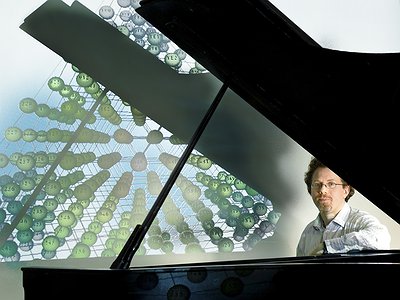Name: Dmitri Tymoczko
Nationality: American
Occupation: Composer/musical theorist
Current Release: Fools & Angels on New Focus
Recommendation: Eunoia by Christian Bök. Five chapters, each using only one vowel, not repeating the larger words: “Awkward grammar appals a craftsman …” It is very musical, as structured as Milton Babbitt but much funnier.
Website/Contact - You can read more about Dmitri's philosphies and hear his music on his website http://dmitri.mycpanel.princeton.edu/index.html
When did you start composing - and what or who were your early passions and influences?
I started composing in high school, by way of progressive rock and jazz. I loved the Rite of Spring and a few other twentieth-century pieces. I was a fan of Yes and Mike Oldfield. When I was a freshman in college someone played me a Brahms intermezzo and I was blown away. I had a similar feeling a few years later when I first heard Art Tatum; and then again Nancarrow when I was in grad school. Basically, my home turf is complex, kinetic tonality—music where you feel like you’re chasing a train that is always just a little out of your reach.
For most artists, originality is first preceded by a phase of learning and, often, emulating others. What was this like for you? How would you describe your own development as an artist and the transition towards your own voice? What is the relationship between copying, learning and your own creativity?
One of my first pieces is a string quartet called “This Picture Seems to Move”. It appeared on my second CD, Crackpot Hymnal. When I wrote it, I felt that composers had moved on too quickly from the early twentieth-century sweet spot: that magical moment when modernist ideas collided with more traditional music; when many composers had mastered both languages.
I like that piece but it is much more “in the pocket” than some of my other music. I wanted to prove to myself that I could really write tonal music, that I could use familiar chords and rhythms to express something sincere that didn’t sound like quotation.
What were some of the most important creative challenges when starting out as a composer and how have they changed over time?
There was a social and aesthetic challenge. I am old enough that when I started out, atonal composition was still the dominant language: many of my teachers were twelve-tone composers, and there was not a lot of interest in the music I was most drawn to. Even in graduate school, many of my professors were open about their belief that my music was too tonal.
Coupled with this was an intellectual challenge, which is that the mechanisms of sophisticated tonal music were not well understood. In many ways, tonality is an embodied language, a matter of non-theoretical know-how. I think a lot of that knowledge got lost over the course of the twentieth century, to the point where my generation (and the generations after) were in the position of reinventing the wheel, rediscovering techniques that were once widespread. This is one reason I wrote my book (A Geometry of Music).
Tell us about your studio/work space, please. What were criteria when setting it up and how does this environment influence the creative process? How important, relatively speaking, are factors like mood, ergonomics, haptics and technology for you?
I usually compose at home, at a large, old, wooden schoolteacher’s desk with a digital piano next to it; it’s what I’ve used for about 20 years. Actually, now that you ask, I have suddenly started thinking that it might be time for a studio makeover. I am relatively insensitive to environment, and have composed in a variety of places (e.g. the airplane). In general, though, the feeling of being at home is helpful to me – so I’ve never really understood the idea of an artist’s colony.
In terms of mood, it is helpful to get into one of two psychological states, more about that below; though when you have kids you don’t always have that luxury. I remember hearing a story about how the creators of the “Loony Tunes” cartoons would have “yes meetings” where only positive feedback was allowed. Ever since then I have tried to have days that I declare to be “yes days”: days where I am relentlessly positive and compose very quickly, sending the critical faculty on a small vacation. I have to constantly remind myself that I can always fix things later. So, I generally have “creation days” and “fixing things days.”
Could you take us through a day in your life, from a possible morning routine through to your work? Do you have a fixed schedule? How do music and other aspects of your life feed back into each other - do you separate them or instead try to make them blend seamlessly?
My work time is basically divided into teaching, composing and thinking about music theoretically. These activities all tend to reinforce each other, with theory suggesting compositional directions, and compositional interests helping to direct my theoretical ideas. I mostly work in the morning and early afternoon when my brain is fresh—I am a bit of an insomniac and so if I work too late I have trouble sleeping. Fortunately, I have a job that leaves me a lot of time for research and creative work.
The actual day itself is pretty boring: coffee, get the kids to school, answer emergency emails, then start composing …
There are many descriptions of the ideal state of mind for being creative. What is it like for you? What supports this ideal state of mind and what are distractions? Are there strategies to enter into this state more easily?
Honestly, the best state of mind for me is blind panic. Deadline coming, no ideas, too much procrastination … sometimes this is enough to dampen the critical faculties just long enough to allow fresh ideas to flow.
My colleague Paul Lansky once said to me “you have to find a way to have fun when composing,” and that is something that has stuck with me. I tend to make a lot of jokes in daily life, and I am correspondingly interested in humor in music—not silliness or zaniness, but genuine humor that has a serious edge. I hear this in a lot of popular music, but it is hard to create this effect in purely instrumental contexts.
One thing I like to say to myself is that musical composition is a logical deduction from absurd premises. To me, that captures the way rigor and fantasy are both essential to the enterprise. As I said, I tend to separate these two, so I have days when I am free and spontaneous, balanced with days that are rigorous and logical.
Could you take me through the process of composing on the basis of one of your pieces that's particularly dear to you, please? Where did the ideas come from, how were they transformed in your mind, what did you start with and how do you refine these beginnings into the finished work of art?
It is a hard question, because I often take months writing a piece and it is difficult to compress that much time into a short description. As a general rule, I tend to start by getting as many ideas as I can onto the page: I’ll end up with twenty little snippets of music, all individual files on my computer, that have nothing to do with each other. During this time, I am trying to be as uncritical as possible, just amusing myself with ideas I find funny or intriguing. Often, the ideas are generated, at least partly, by computer: little Max patches where I explore a texture or melodic process, typically in an interactive and improvisatory way.
The next stage is thinking about how these ideas might belong together: it might be that ideas 1, 7, and 13 seem to resonate and relate, while 2, 4, and 5 form a similar group. Some of the ideas get thrown away or saved for a different piece. At that point, I have some idea for where I am going: my job is to get from idea 7 to idea 1 for example, or to rework idea 13 so that it uses the same harmonies as idea 9.
The third stage is continuity and narrative, making these various snippets work together to form a dramatic statement. Here is where rigor is important. Often it is at this stage that a title occurs to me—sometimes with a dramatic clarifying effect, a little communication from myself to myself: “oh, so that’s what this piece is about!” Once I realize what I have been doing I can finish the piece.
I have a piano piece called “Missed Connections,” where the middle movement began in a really odd way: I programmed a Max patch to generate random little piano melodies with the sustain pedal held down. Some of these I would save by assigning them to a key on my laptop keyboard, others I would throw away. I could recall the saved ideas by pressing “Q” or “W” (or whatever) on the laptop, layering them on top of themselves.
This struck me as a pretty silly way to spend my time, so I put that “project” away for a while. A little while later, Barbara Montero (who is both a philosopher and a dancer) mentioned that she was looking to create a dance piece about what it was like to be a bat (the subject of a famous philosophy article), and I realized that my strange compositional process was a kind of metaphor for both natural selection (with me alternately saving and killing off these randomly generated ideas) and for the bat’s method of “seeing” by way of echoes. And so, this brought me back to the piece, which I called “echolocation”—a short little etude where all the music is generated by a small number of randomly-generated ideas. The result is a weirdly biological spin on rigorous Webernian counterpoint, the Bauhaus as redone by Gaudi.



